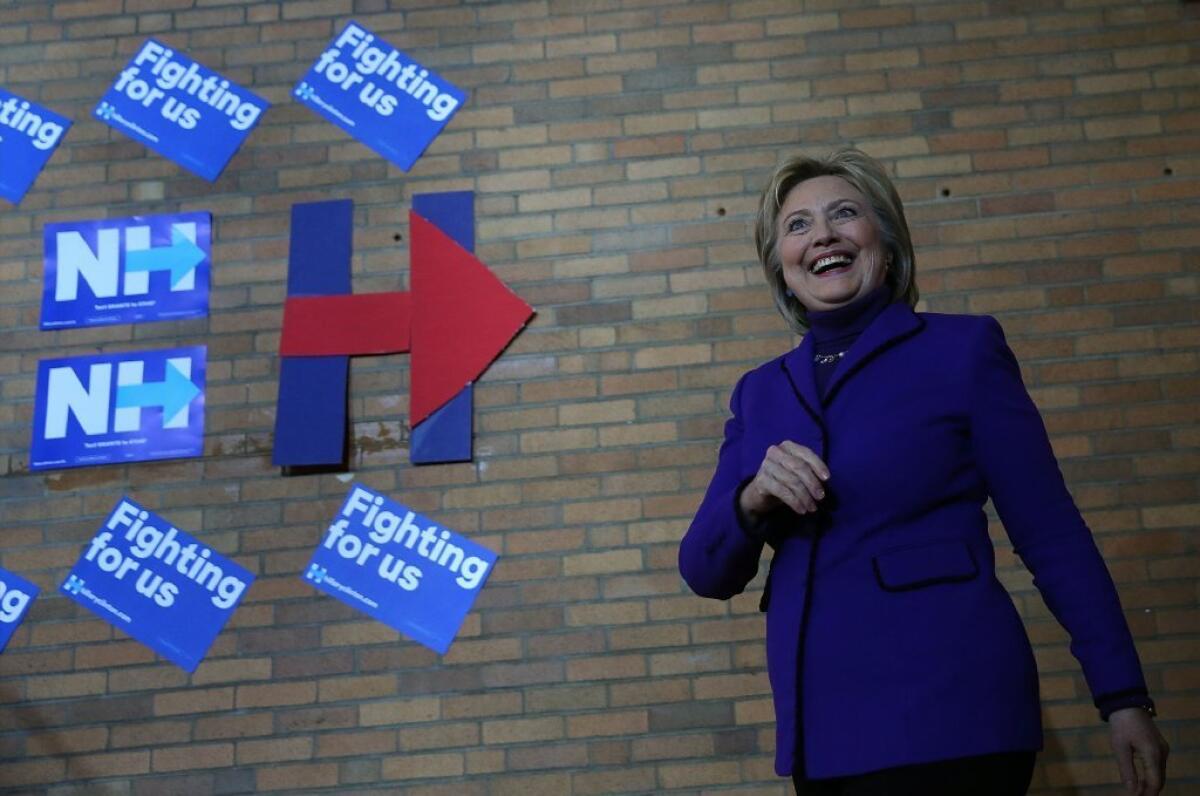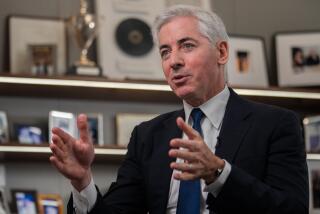Opinion: Hillary Clinton’s corporate speeches are a MacGuffin for her critics

Hillary Clinton arrives at a campaign event Friday in Manchester, N.H.
“This just in: In a lavishly compensated speech to hedge-fund managers, former Secretary of State Hillary Clinton promised, if ever elected president, that she would unfailingly do the bidding of Wall Street. ‘I am at your disposal 24 hours a day, seven days a week,’ Clinton told the assembled financial manipulators. ‘When I am bought, I stay bought.’ ”
This, I suspect, is the sort of smoking gun some supporters of Sen. Bernie Sanders hope would turn up if Clinton produced the transcripts of the speeches she delivered after she left the Obama administration in 2013.
In Thursday’s debate with Sanders, Clinton hemmed and hawed when asked if she would release the transcripts of speeches she delivered to employees of Goldman Sachs and other audiences. Reportedly Goldman Sachs paid her $675,000 for three speeches.
“I will look into it,” she said. “I don’t know the status, but I will certainly look into it.”
That answer could only exacerbate the impression many voters have that Clinton is constitutionally predisposed to hide things. (See the controversy over her private email server, which now seems to have been a repository for sensitive government communications.) Clinton should have answered this question with one word: “Yes.”
That said, I expect that the transcripts, if they are released, will be anticlimactic and that the objectively most embarrassing revelation will be that Clinton gave the same speech to different audiences.
That’s what celebrity speakers often do for honorariums that ordinary folks find obscene. For example, Clinton said that “I probably described more times than I can remember how stressful it was advising the president about going after Bin Laden.” That sort of war story would thrill any audience, whether it comprised hedge-fund managers or Cub Scouts.
It’s possible, of course, that there might be snippets of Clinton’s speeches that could be cited in the support of the idea that she is too “cozy” with Wall Street, which Sanders characterized in the debate as essentially a criminal enterprise. ( “[I]n my view, the business model of Wall Street is fraud. It’s fraud. I believe that corruption is rampant.”)
Suppose, for example, that she extended warm personal greetings to particular Goldman Sachs bigwigs in the audience, or repeated this observation from a 2007 speech she delivered as a U.S. senator to business leaders assembled at an office of the Nasdaq stock exchange on Dec. 5, 2007:
“I see a lot of people who I recognize in this audience that are integral to what happens in our markets, how we create wealth, how we provide a dynamic economy that will hold out the promise of a better life for so many of our fellow citizens, but indeed for people far flung from here.”
(In the same speech, she said that “we need to acknowledge that Wall Street has played a significant role in the current problems, and in particular in the housing crisis.” But Sanders supporters might see that as mere window dressing.)
The transcripts of Clinton’s speeches function for her critics as a kind of MacGuffin, an intrinsically unimportant document or object in a movie that nevertheless advances the plot. The plot here is the allegation that Clinton is a “corporatist” with compromising ties to Wall Street. The quest for those transcripts move the action along even if the documents themselves turn out to contain nothing sensational.
Follow Michael McGough on Twitter @MichaelMcGough3
More to Read
A cure for the common opinion
Get thought-provoking perspectives with our weekly newsletter.
You may occasionally receive promotional content from the Los Angeles Times.







